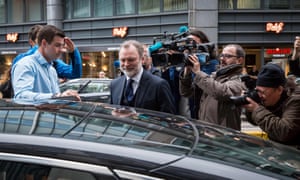
Go to a big EU summit and, backstage, you’ll see journalists from (now) 27 countries queuing up to get their deadline fix from 27 different spokesmen representing 27 national leaders. All may eat their cakes of triumph this way; a time-honoured means of keeping everyone happy. But what if the Brexit cake has crumbled already? How can 27 states of separation – plus briefing Britain – make sense of the negotiation years?
Theresa May says she doesn’t want a running commentary, but there’s fat chance of avoiding one in a 24/7 news world, speeches examined as though they were holy writ. Worse, the traditional British redtop way of reporting Brussels from a cosy desk in the Palace of Westminster threatens constant bad temper and bad information.
It’s standard-issue wisdom when Rod Liddle in the Bun reckons “the whole European edifice will collapse pretty soon … like watching an amputee playing Jenga”. It’s standard-issue bile when the Mail plonks Nigel Farage on its front again (“Cheers to a great British future”) and finds the EU already “wailing” over “Theresa’s security blackmail”.
But in the real world of hard pounding – of what May calls give and take – readers with businesses to run or futures to explore are going to need __more nourishing fare: and the channels of information are notoriously clogged.
Nothing will come easy on the EU side as commission, council and parliament all try to align their negotiating hands – even before, as last week, Mrs Merkel stirs her own moving finger in the pot. The reporting mechanisms that fit this tangle aren’t very evident, merely a morass of conflicting interests. But they look simple beside a British negotiating position that makes Europe the enemy (“We’ll hurt the British, snarls Hollande – as Brussels bites back …” in the Mail), then swiftly turns on the enemy within (“hysterical Nick Clegg, turncoat Nicky Morgan and compulsive liar Alastair Campbell selling the country short”).
Let’s suppose, in May’s terms, that we all want to best deal for Britain now, however undefined. That divisions need healing, bridges building, cliches freshly minting. How is this supposed to happen amid a constant stream of (no doubt “lighthearted”) invective turned against MPs, journalists and the chancelleries of Europe by various factions of Tory support? Where’s the give, where’s the take? And how, __more importantly, are readers and viewers to make sense of things in coming years?
They’ll need to find a daily with properly diligent reporters in Brussels, of course. They’ll need the BBC – whether helped or hindered by round-robins of support – to stand tall. They’ll need to cross-check with the FT. Readers sucked in deep may come to bless Politico, the site where European politics gets pulled every which way. But, overwhelmingly, they’ll also need journalism that digs out facts and sets them in context, information that explains rather than infuriates.
Could May, next time Paul Dacre comes to supper, make that explicit (with open memos to Richard Desmond, Rupert et al)? The best deal for Britain means light, not heat – and as many buttoned lips as possible. The best deal is calm give and take, not ritual Punch and Judy.
• The problem isn’t that the average age of BBC1 viewers has jumped to 61. The problem is stopping premature ageing as the most stultifying news formula of them all becomes ubiquitous. Assemble a “balanced” panel from Hull, Halifax or Heckmondwike. Tell them to discuss their own views on Brexit a year or an eternity later. They can’t say anything interesting. And – balance again – we can’t risk any conclusions. Time for a cup of Typhoo, mother … there’s another vox pop coming on.